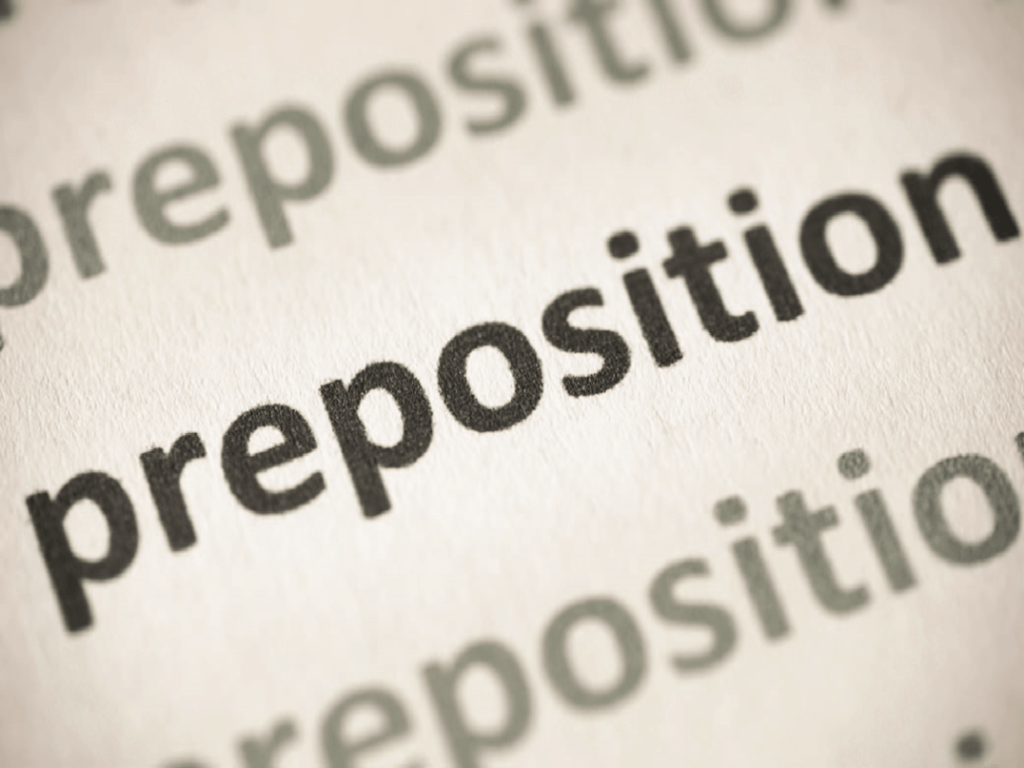When it comes to language learning, one good thing about prepositions is that they are limited; they belong to a closed class of words, just like pronouns. Additionally, in the case of Arabic grammar, they are simple when conjugating them with pronouns. Arabic preposition particles are Mabni words كلمات مبنية which means that they mostly have a fixed pronunciation regardless of their position in the sentence.
With this in mind, we would now like to discuss the meanings and uses of some common Arabic prepositions:
مِــن / Miin / From, Some of or One of
This prepositions refers to initiating an action from some place, or it can mean “some of”. It can also refer to the gender or species meaning “one of”.
Example:
I walked from my home to school. / mshetu mn bayte ella al madrasah / مشيتُ من بيتي إلى المدرسة.
A cup of coffee in Arabic / finjan miin al qahwa ] /فنجان من القهوة
I spent from (= some of) my savings. / anfaqtu min muddakhratti / أنفقتُ مِـن مدخراتي
إلى / Ilaa / To or At
This preposition refers to destination.
Example:
The train arrived at (got to) the station. / wasalla al qittaru ella al mahattah / وصلَ القطارُ إلى المحطةِ
عـَـن / Aan / From or About
This preposition means “about” or “awayfrom” something or someone.
Example:
I read a book about Naguib Mahfouz. / qara’tu kittaban an najeeb mahfouz/ قرأتُ كتاباً عـن نجيب محفوظ
I walked away from the grass. / mashetu ba’edan an al hasha’esh / مشيتُ بعيداً عن الحشائش
على / Aala / On or Above
This preposition refers to the top place of something and means “on”.
Example:
The book is on the desk. / al kittabu ala al maktab / الكتابُ على المكتبِ
في / Fee / In or Into
This preposition refers to something happening inside.
Example:
There are a few students in the classroom. / yojad al qaleelu min al tullab fe al fasl / يوجد القليل من الطلابِ في الفصلِ
الباء / بِ / Al Ba, or simply Ba / By, With, In or At
This preposition can refer to the reason meaning “by”, or it can mean “with“. It can also refer to the place meaning “in” or “at“.
Example:
You succeed by working hard. / tanjahu bel amal al jad / تنجحُ بالعملِ الجاد
With science, you build minds. / bel ‘elm tubna al oqool / بالعلمِ تبنى العقول
Mohammad is at home. / mohammad bel bayt / محمدٌ بالبيتِ
The friends meet in the club. / yajtami\u al asdiqaa’ bel naddi / يجتمع الأصدقاءُ بالنادي
الكاف / ك / Ka / Like or As
This preposition expresses simile التشبيه meaning “like” or “as“.
Example:
False hopes are like a mirage. / al amani al khadi’a kal sarab / الأمانيُّ الخادعةُ كالسرابِ
He works like a machine. / howa ya’malu kal ‘aalah / هو يعمل كالآلةِ
Time is like a sword / al waqtu kal sayf / الوقت كالسيف
اللام / Al Llam / To or For
This preposition can refer to the reason or the possession.
Example:
Students go to school to learn (for learning). / yathhabu al tulab lil madrasah lil ta’alim / يذهب الطلابُ للمدرسةِ للتعلمِ
Success is for the hard-working. / al najjaahu lil mujtahideen / النجاحُ لِلمجتهدين
حتى / Hattaa / Until
This preposition refers to finishing something or the end of something.
Example:
People learn until they die. / / يتعلم الناسُ حتى يموتون
و / Wa / And
This is used when there are multiple items to be listed.
Apples and oranges are my favorite fruits / al tufah wa al burtuqal miin al fawakih almufadalah lday /
التفاح والبرتقال من الفواكه المفضلة لدي
This concludes our article about Arabic prepositions. They are an important part of speech, especially since some of them might make the words unrecognizable when hearing them together in a sentence.
If you wish to learn more about the Arabic language, download our Arabic learning app




